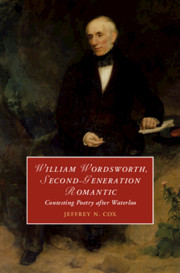Book contents
- William Wordsworth, Second-Generation Romantic
- Cambridge Studies in Romanticism
- William Wordsworth, Second-Generation Romantic
- Copyright page
- Dedication
- Contents
- Figures
- Acknowledgments
- Abbreviations
- Introduction
- Chapter 1 Cockney Excursions
- Chapter 2 Wordsworth’s “Thanksgiving Ode”
- Chapter 3 “This Potter-Don-Juan”
- Chapter 4 Thinking Rivers
- Chapter 5 Late “Late Wordsworth”
- Postscript Wordsworth in 1850
- Notes
- Select Bibliography
- Index
- Cambridge Studies in Romanticism
Chapter 4 - Thinking Rivers
The Flow of Influence, Wordsworth–Coleridge–Shelley
Published online by Cambridge University Press: 10 June 2021
- William Wordsworth, Second-Generation Romantic
- Cambridge Studies in Romanticism
- William Wordsworth, Second-Generation Romantic
- Copyright page
- Dedication
- Contents
- Figures
- Acknowledgments
- Abbreviations
- Introduction
- Chapter 1 Cockney Excursions
- Chapter 2 Wordsworth’s “Thanksgiving Ode”
- Chapter 3 “This Potter-Don-Juan”
- Chapter 4 Thinking Rivers
- Chapter 5 Late “Late Wordsworth”
- Postscript Wordsworth in 1850
- Notes
- Select Bibliography
- Index
- Cambridge Studies in Romanticism
Summary
Wordsworth’s sonnets on the River Duddon appeared in 1820 to almost universal applause and marked a shift in his reputation and status as a poet. What has not been understood is how imbricated these poems are in a dialogue with Coleridge, whom Wordsworth alludes to, and with Shelley, whose “Mont Blanc” appears to be echoed throughout the series. This chapter provides a key instance of the complex interactions between these writers, as Shelley in “Mont Blanc” echoes in order to critique both Wordsworth and Coleridge and as Wordsworth then responds in these sonnets. Various paratexts, including the notes to the poems and Wordsworth’s postscripts, help us see how Wordsworth explicitly alludes to minor poets and to Coleridge’s unfinished “The Brook” while masking his debt to his younger competitor, whom Wordsworth would later call “one of the best artists of us all.” Offering readings of individual poems as well as the series as a whole, this chapter shows how Wordsworth, in answering Shelley, the famous agnostic, resituates his earlier nature poetry in a more clearly religious frame.
Information
- Type
- Chapter
- Information
- William Wordsworth, Second-Generation RomanticContesting Poetry after Waterloo, pp. 129 - 156Publisher: Cambridge University PressPrint publication year: 2021
